
“10 Life-Changing Benefits of Choosing Vegetarianism”
10 Life-Changing Benefits of Choosing Vegetarianism
Discover the life-changing benefits of choosing a vegetarianism that can transform your health, environment, and overall well-being.
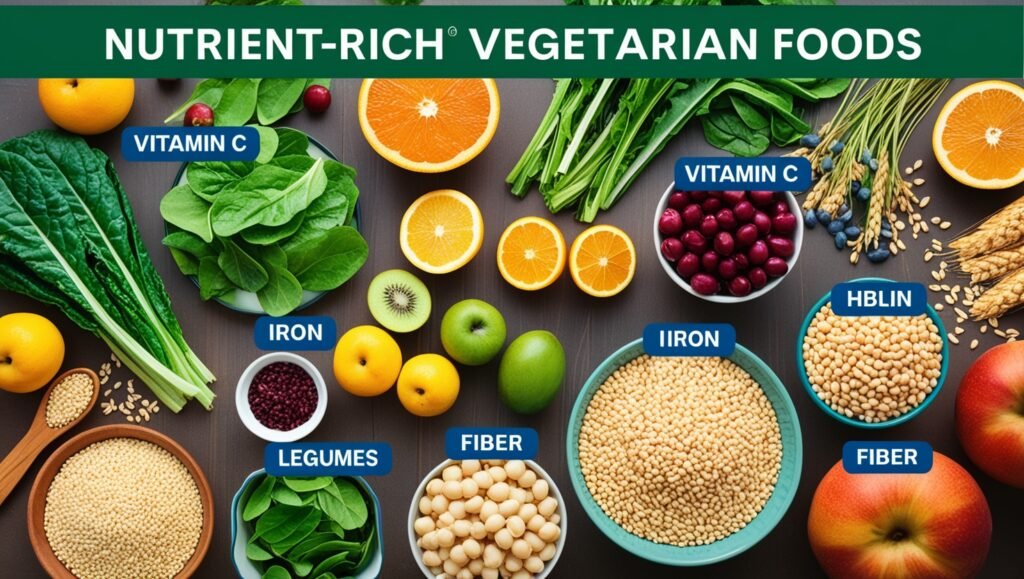
Introduction
Brief Overview of Vegetarianism
Vegetarianism is a dietary lifestyle that excludes meat, fish, and poultry. Vegetarians primarily consume plant-based foods such as fruits, vegetables, grains, legumes, nuts, and seeds. Some vegetarians may also include dairy products and eggs in their diet, depending on their specific dietary preferences.
Importance of Diet Choices on Health and Environment
The choices we make about our diet have significant impacts on both our health and the environment. A well-balanced vegetarian diet can provide numerous health benefits, including improved heart health, better weight management, and reduced risk of chronic diseases. Additionally, adopting a vegetarian lifestyle can contribute to environmental sustainability by reducing the demand for meat production, which is associated with high greenhouse gas emissions, deforestation, and water usage. Read also: “10 Amazing Health Boosts from Seabuckthorn”
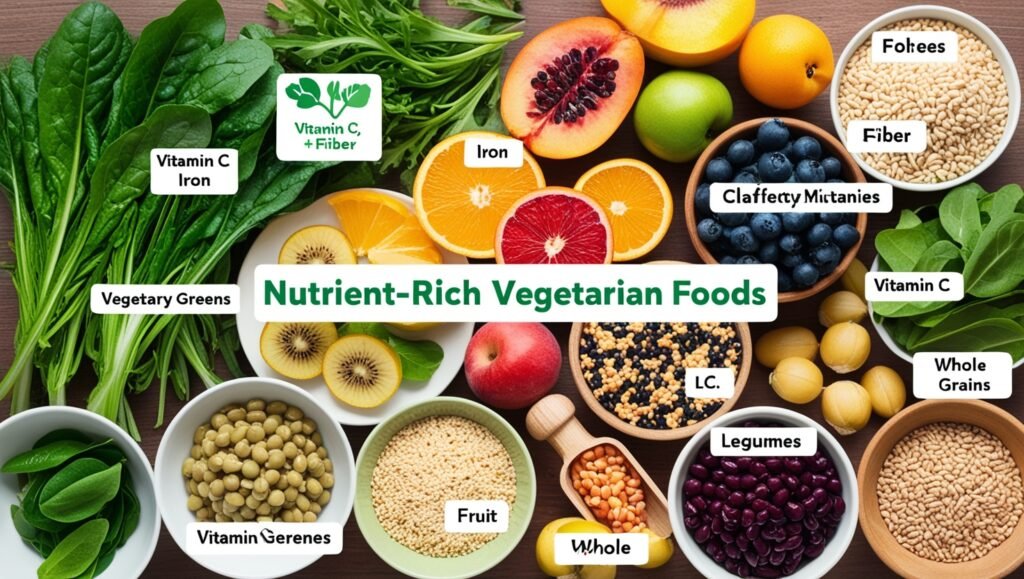
Benefit 1: Improved Heart Health
Explanation of How a Vegetarian Diet Supports Cardiovascular Health
A vegetarian diet supports cardiovascular health by reducing the intake of saturated fats and cholesterol, which are commonly found in animal products. Plant-based foods are rich in heart-healthy nutrients such as fiber, antioxidants, and unsaturated fats. These nutrients help lower blood pressure, reduce cholesterol levels, and improve overall heart function.
Key Nutrients in Vegetarian Foods That Benefit the Heart
Several key nutrients in vegetarian foods contribute to heart health:
- Fiber: Found in fruits, vegetables, whole grains, and legumes, fiber helps lower cholesterol levels and maintain healthy blood pressure.
- Antioxidants: Present in a variety of plant-based foods, antioxidants protect the heart by reducing oxidative stress and inflammation.
- Unsaturated Fats: Found in nuts, seeds, avocados, and olive oil, unsaturated fats help improve cholesterol levels and reduce the risk of heart disease.
- Potassium: Abundant in fruits and vegetables, potassium helps regulate blood pressure and supports heart function.
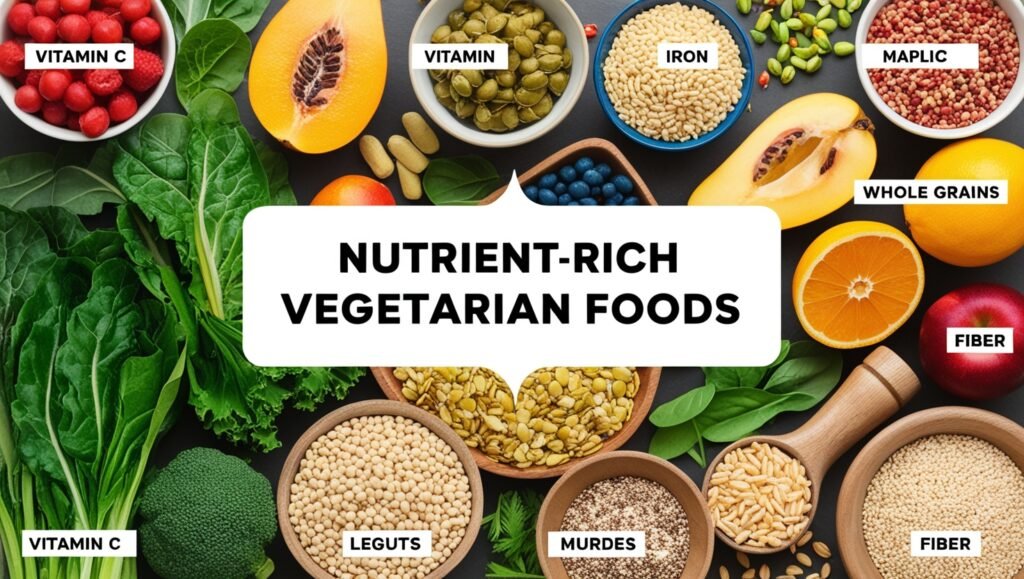
Benefit 2: Weight Management
How a Vegetarian Diet Can Help with Weight Loss and Maintenance
A vegetarian diet can be effective for weight loss and maintenance due to its emphasis on nutrient-dense, low-calorie foods. Plant-based foods are generally lower in calories and higher in fiber compared to animal products, which can help promote satiety and reduce overall calorie intake. Additionally, the high fiber content in vegetarian foods aids in digestion and helps regulate blood sugar levels, further supporting weight management.
Examples of Low-Calorie, Nutrient-Dense Vegetarian Foods
Here are some examples of low-calorie, nutrient-dense vegetarian foods that can support weight management:
- Leafy Greens: Spinach, kale, and Swiss chard are low in calories but high in vitamins, minerals, and fiber.
- Fruits: Berries, apples, and citrus fruits provide essential nutrients and antioxidants while being low in calories.
- Legumes: Lentils, chickpeas, and black beans are rich in protein and fiber, making them filling and nutritious.
- Whole Grains: Quinoa, brown rice, and oats offer complex carbohydrates and fiber, providing sustained energy and satiety.
- Vegetables: Broccoli, cauliflower, and bell peppers are packed with vitamins, minerals, and fiber, making them excellent choices for a healthy diet.
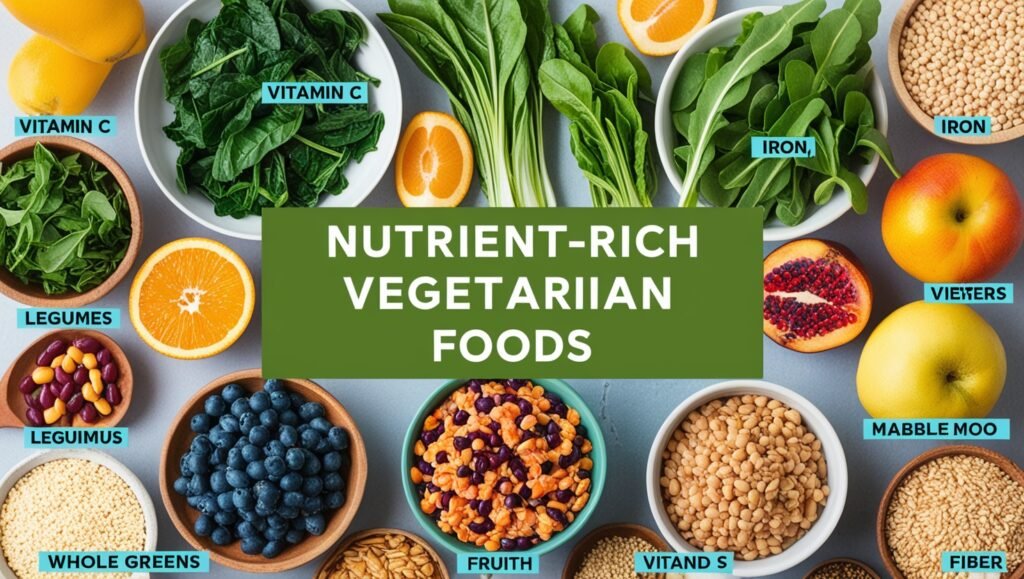
Benefit 3: Enhanced Digestive Health
Role of Fiber-Rich Vegetarian Foods in Promoting Gut Health
Vegetarian foods are typically rich in dietary fiber, which plays a crucial role in promoting gut health. Fiber adds bulk to the stool, making it easier to pass and preventing constipation. It also acts as a prebiotic, feeding the beneficial bacteria in the gut and supporting a healthy microbiome. A balanced gut microbiome is essential for proper digestion, nutrient absorption, and overall digestive health.
Benefits of a Plant-Based Diet for Digestion
A plant-based diet can significantly improve digestion by providing a variety of fiber-rich foods. These foods help regulate bowel movements, reduce the risk of digestive disorders, and promote a healthy gut environment. Additionally, the anti-inflammatory properties of many plant-based foods can help soothe the digestive tract and reduce symptoms of conditions like irritable bowel syndrome (IBS) and inflammatory bowel disease (IBD).
Benefit 4: Reduced Risk of Chronic Diseases
How a Vegetarian Diet Lowers the Risk of Diseases Like Diabetes and Cancer
A vegetarian diet can lower the risk of chronic diseases such as diabetes and cancer. Plant-based foods are rich in antioxidants, vitamins, and minerals that help protect the body from oxidative stress and inflammation, which are key factors in the development of chronic diseases. Additionally, vegetarian diets are typically lower in saturated fats and cholesterol, which can reduce the risk of heart disease and type 2 diabetes.
Studies Supporting the Health Benefits of Vegetarianism
Numerous studies have shown the health benefits of a vegetarian diet. Research indicates that vegetarians have a lower risk of developing chronic diseases, including heart disease, diabetes, and certain types of cancer. For example, a study published in the Journal of the American Heart Association found that a plant-based diet was associated with a lower risk of cardiovascular disease. Another study in the American Journal of Clinical Nutrition reported that vegetarians had a lower risk of developing type 2 diabetes compared to non-vegetarians.
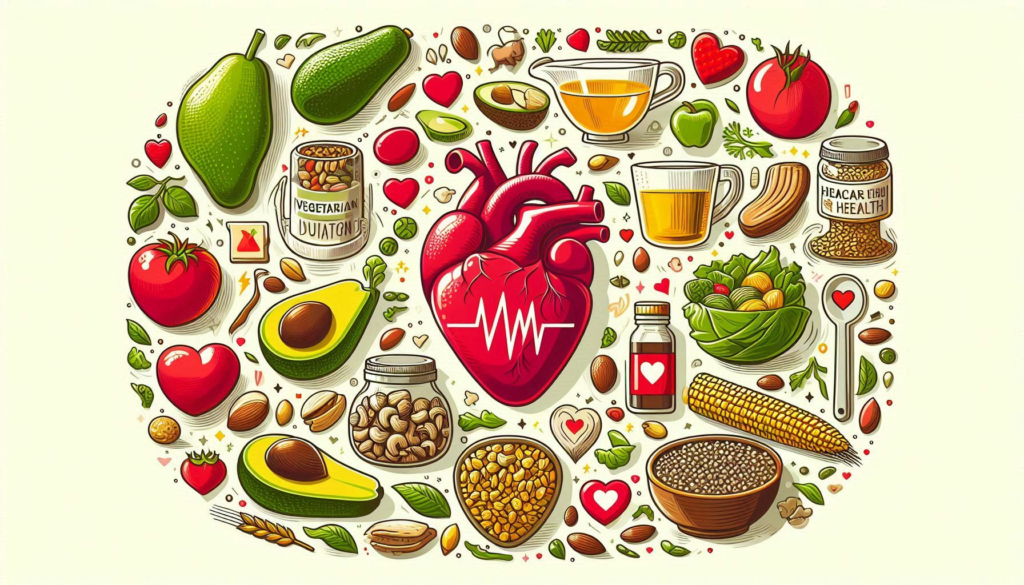
Benefit 5: Increased Nutrient Intake
Overview of Essential Vitamins and Minerals Found in Vegetarian Foods
Vegetarian foods are rich in essential vitamins and minerals that are crucial for overall health. Some of the key nutrients found in vegetarian foods include:
- Vitamin C: Supports the immune system and acts as an antioxidant.
- Vitamin A: Important for vision, immune function, and skin health.
- Vitamin K: Essential for blood clotting and bone health.
- B Vitamins: Aid in energy production and support brain function.
- Iron: Crucial for the production of red blood cells and oxygen transport.
- Calcium: Vital for bone health and muscle function.
- Magnesium: Supports muscle and nerve function, as well as energy production.
How a Vegetarian Diet Can Meet Nutritional Needs
A well-planned vegetarian diet can meet all of your nutritional needs. By including a variety of fruits, vegetables, whole grains, legumes, nuts, and seeds, you can ensure that you get a balanced intake of essential nutrients. It’s important to pay attention to certain nutrients that may be less abundant in a vegetarian diet, such as vitamin B12, iron, and omega-3 fatty acids. These can be obtained through fortified foods, supplements, or specific plant-based sources like flaxseeds and chia seeds.
Benefit 6: Better Blood Sugar Control
Impact of a Vegetarian Diet on Blood Sugar Levels
A vegetarian diet can help improve blood sugar control and reduce the risk of developing type 2 diabetes. Plant-based foods are generally low in glycemic index, meaning they cause a slower and more gradual rise in blood sugar levels. This helps prevent spikes and crashes in blood sugar, which can be beneficial for individuals with diabetes or those at risk of developing the condition.
Benefits for Individuals with Diabetes or at Risk of Diabetes
For individuals with diabetes or those at risk of developing diabetes, a vegetarian diet can offer several benefits:
- Improved Insulin Sensitivity: Plant-based diets have been shown to improve insulin sensitivity, making it easier for the body to regulate blood sugar levels.
- Weight Management: A vegetarian diet can help with weight loss and maintenance, which is important for managing diabetes.
- Reduced Inflammation: The anti-inflammatory properties of many plant-based foods can help reduce inflammation, which is a contributing factor to insulin resistance and diabetes.
By adopting a vegetarian diet, individuals can better manage their blood sugar levels and reduce the risk of developing diabetes.

Benefit 7: Improved Skin Health
How a Vegetarian Diet Can Lead to Clearer, Healthier Skin
A vegetarian diet can significantly improve skin health due to its high content of vitamins, minerals, and antioxidants. Plant-based foods are rich in nutrients that promote skin hydration, repair, and protection. The absence of processed meats and high-fat animal products can also reduce the occurrence of skin issues such as acne and inflammation.
Nutrients in Vegetarian Foods That Support Skin Health
Several key nutrients in vegetarian foods contribute to healthier skin:
- Vitamin C: Found in citrus fruits, bell peppers, and strawberries, vitamin C is essential for collagen production and skin repair.
- Vitamin E: Present in nuts, seeds, and leafy greens, vitamin E acts as an antioxidant, protecting the skin from damage and promoting a youthful appearance.
- Beta-Carotene: Found in carrots, sweet potatoes, and spinach, beta-carotene is converted to vitamin A in the body, supporting skin cell regeneration and reducing the risk of skin conditions.
- Omega-3 Fatty Acids: Present in flaxseeds, chia seeds, and walnuts, omega-3 fatty acids help maintain skin hydration and reduce inflammation.
Benefit 8: Enhanced Mental Well-being
Connection Between a Vegetarian Diet and Mental Health
A vegetarian diet can positively impact mental health by providing essential nutrients that support brain function and emotional well-being. Plant-based foods are rich in vitamins, minerals, and antioxidants that help reduce inflammation and oxidative stress, which are linked to mental health disorders.
Benefits of Plant-Based Foods for Mood and Cognitive Function
Several benefits of a vegetarian diet for mental well-being include:
- Improved Mood: Foods rich in omega-3 fatty acids, such as flaxseeds and walnuts, can help improve mood and reduce symptoms of depression and anxiety.
- Enhanced Cognitive Function: Antioxidants found in fruits and vegetables protect brain cells from damage and support cognitive function.
- Reduced Stress: Magnesium-rich foods like leafy greens and nuts help regulate stress hormones and promote relaxation.
- Better Sleep: A diet high in fiber and low in saturated fats can improve sleep quality, which is essential for mental health.
Benefit 9: Environmental Sustainability
Positive Impact of Vegetarianism on the Environment
Adopting a vegetarian diet can have a significant positive impact on the environment. The production of plant-based foods generally requires fewer resources and generates lower greenhouse gas emissions compared to meat production. By reducing the demand for meat, vegetarianism helps conserve water, reduce deforestation, and decrease pollution.
How Reducing Meat Consumption Helps Conserve Resources
Several ways in which reducing meat consumption benefits the environment include:
- Lower Greenhouse Gas Emissions: Livestock farming is a major contributor to greenhouse gas emissions. A vegetarian diet reduces the carbon footprint associated with food production.
- Water Conservation: Producing plant-based foods requires significantly less water compared to raising livestock. Reducing meat consumption helps conserve this vital resource.
- Reduced Deforestation: Large areas of forests are cleared for livestock grazing and feed production. A vegetarian diet helps reduce the demand for land, preserving natural habitats and biodiversity.
- Decreased Pollution: Livestock farming generates significant amounts of waste and pollutants. By choosing plant-based foods, we can reduce the environmental impact of food production.
Benefit 10: Ethical Considerations
Ethical Reasons for Choosing a Vegetarian Diet
One of the most compelling reasons for adopting a vegetarian diet is the ethical consideration of animal welfare. Many people choose vegetarianism to avoid contributing to the suffering and exploitation of animals. The meat industry often involves practices that are harmful to animals, including confinement, inhumane treatment, and slaughter. By choosing a vegetarian diet, individuals can take a stand against these practices and promote more humane treatment of animals.
Impact on Animal Welfare and Reducing Animal Cruelty
Adopting a vegetarian diet can significantly reduce the demand for meat, leading to fewer animals being raised and slaughtered for food. This reduction in demand can help decrease the number of animals subjected to factory farming conditions, which are often associated with overcrowding, lack of access to natural behaviors, and poor living conditions. By choosing plant-based foods, individuals can contribute to a more compassionate and ethical food system that prioritizes animal welfare.
Conclusion
Recap of the Life-Changing Benefits of Vegetarianism
Choosing a vegetarian diet offers numerous life-changing benefits, including improved heart health, better weight management, enhanced digestive health, reduced risk of chronic diseases, increased nutrient intake, better blood sugar control, improved skin health, enhanced mental well-being, environmental sustainability, and ethical considerations. These benefits highlight the positive impact that a vegetarian lifestyle can have on both personal health and the world around us.
Encouragement to Consider Adopting a Vegetarian Lifestyle
Adopting a vegetarian lifestyle can be a transformative and rewarding experience. Whether you are motivated by health benefits, environmental concerns, or ethical reasons, making the switch to a plant-based diet can lead to a healthier, more sustainable, and compassionate way of living. Start by incorporating more plant-based foods into your meals and exploring delicious vegetarian recipes. Every small step towards a vegetarian diet can make a significant difference for your health and the plan



One Comment
Pingback: